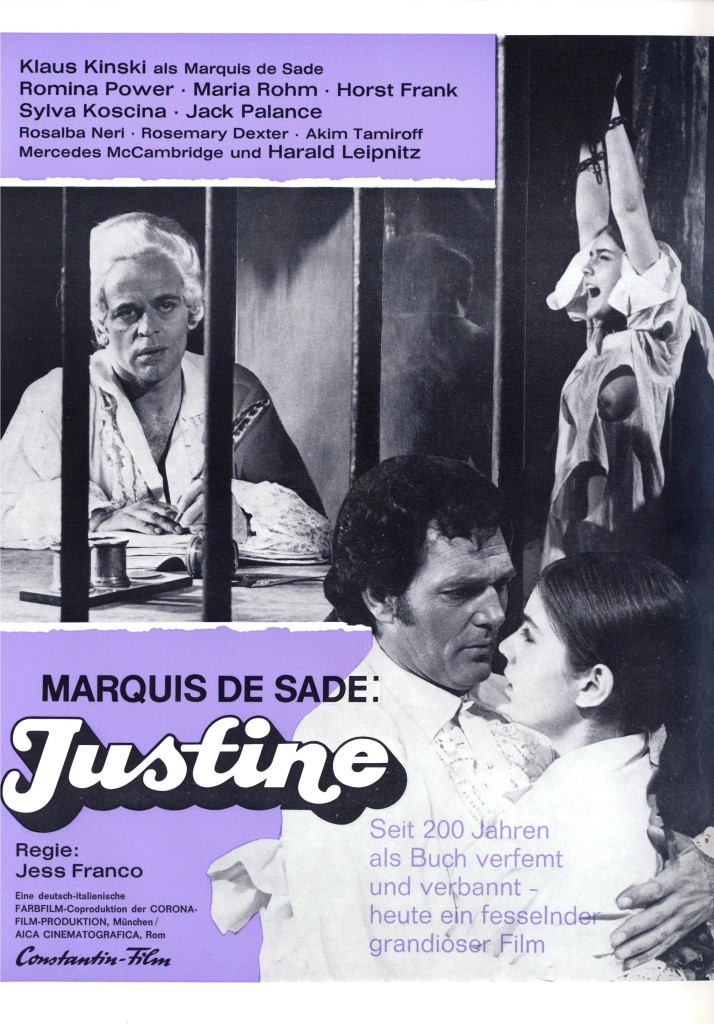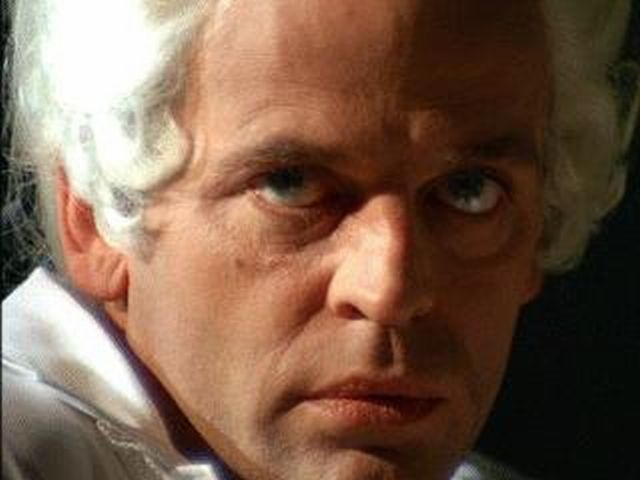Dir: Jess Franco
Star: Romina Power, Maria Rohm, Mercedes McCambridge, Klaus Kinski
a.k.a. Marquis de Sade: Justine
“Contrary to his reputation, [Klaus] was not difficult to direct. We made seven films together, without any hassle and he was wonderful: friendly, gentle as a child, except, of course, when he got pissed off. This great master didn’t have problems, except with idiots. When a small-time filmmaker told him nothing at all except, “Sit there and smile”, he got angry.”
— Jess Franco
 Kinski is certainly a good choice to play the Marquis de Sade, between those full lips and a sense of overwhelming cruelty lurking not far behind his eyes. So, I was surprised to learn he was actually not the first pick for the role: it was originally supposed to be Orson Welles, who apparently backed out after reading the script. I’m not certain quite what Franco’s thought process was here: I’m hard pushed to think of any character where you’d think, “Well, if we can’t get Orson Welles, what about Klaus Kinski?” Though perhaps surprisingly, this film is only one of a number of connections between Welles and Franco. Back in 1965, Franco was the second-unit director on Welles’s Chimes at Midnight, though they reportedly parted on bad terms, and there are at least two other Franco productions in which Welles was linked to roles, including 1975’s The Man From Guyane, which also had Kinski attached to it. And after Welles’s death, Franco took the footage from his unfinished Don Quixote production and turned it into 1992’s Don Quixote de Orson Welles.
Kinski is certainly a good choice to play the Marquis de Sade, between those full lips and a sense of overwhelming cruelty lurking not far behind his eyes. So, I was surprised to learn he was actually not the first pick for the role: it was originally supposed to be Orson Welles, who apparently backed out after reading the script. I’m not certain quite what Franco’s thought process was here: I’m hard pushed to think of any character where you’d think, “Well, if we can’t get Orson Welles, what about Klaus Kinski?” Though perhaps surprisingly, this film is only one of a number of connections between Welles and Franco. Back in 1965, Franco was the second-unit director on Welles’s Chimes at Midnight, though they reportedly parted on bad terms, and there are at least two other Franco productions in which Welles was linked to roles, including 1975’s The Man From Guyane, which also had Kinski attached to it. And after Welles’s death, Franco took the footage from his unfinished Don Quixote production and turned it into 1992’s Don Quixote de Orson Welles.
That’s surprising, because – and let me speak frankly here – Franco is one of the most godawful directors in the history of cinema. I know there are those of a cult persuasion who love his work, but the description of him as a European version of Ed Wood is perhaps closer to the mark, albeit an incredibly prolific Ed Wood with a fondness for sleaze, with Franco not infrequently working in hardcore porn. However, given that, this adaptation of the Marquis de Sade’s Justine: The Misfortunes of Virtue, is actually relatively tame, with only one (admittedly, fairly extended) sequence exhibiting the sadomasochistic bent which was one of the characteristics in much of Franco’s work. It feels more like a historical romp, though does retain some of the cynicism present in the original, which suggests that the wicked are rewarded, and that a life of virtue is simply a meaningless exercise in self-restraint. It is also true that, the novel itself was relatively restrained by de Sade’s standards of depravity. However, the film does present a softer ending than de Sade’s novel, in which the heroine is struck by lightning and killed.
Truth be told, Klaus doesn’t have much to do – not even a single line of dialogue – since the film is not “about” him, except in the sense that the story occasionally flicks back from the main plot, to the Marquis de Sade (Kinski), scribbling feverishly away in his cell at (supposedly) the Bastille. There, he’s tormented by visions of women, inspiring him to inflict further torments of his heroine as she progresses on her journey through life. She is Justine (Power), who along with her sister, Juliette (Rohm), are being brought up in a convent, though Justine is far closer in temperament and outlook to the nuns than Juliette. Their tranquil to the point of boring life is shattered by the news that their father is bankrupt and their mother dead, a double whammy which leads to both sisters being turfed out on the streets of Paris [albeit a Paris oddly equipped with palm trees] with 100 crowns to their name. Juliette says she knows where they can stay: when this turns out to be a notorious brothel, Justine bails.
This kicks off a series of misadventures which see her arrested as a thief; broken out of jail by notorious murderess Madame Dusbois (McCambridge); forced to become part of a gang; turned into a servant to the wife of a gay aristocrat; forced into becoming the sex slave for an order of depraved monks under Brother Antonin (Jack Palance, apparently drunk throughout filming); re-encounters Madame Dusbois and is turned into an 18th-century stripper; is accused of murder; and, finally, encounters her sister again, who has turned her life of depravity into a position as the mistress to a member of the upper classes. Juliette rescues her sister from a likely trip to the guillotine, thanks to her powerful connections. Justine realizes that all her efforts to be good and do the right thing, have not helped her in the slightest, so she might as well have given into her baser tendencies, and used them to her advantage and pleasure, as Juliette did.
 It certainly looks better than the typical Franco low-budgeter – the price-tag on this one was a million bucks, which is close to $7m in today’s money. However, that appears not to have come without its problems. He had originally cast Rosemary Dexter as Justine, but Hollywood’s Golden Rule – he who has the gold, makes the rules – kicked in, one of the producers insisting on Power (daughter of Tyrone Power) for the leading role. The director reluctantly agreed, with Dexter reduced to a small role, but it’s a choice Franco has repeatedly regretted, comparing Power’s performance unfavorably to that of a window dummy. Personally, I didn’t find her particularly grating: she’s playing a wide-eyed innocent, so her lack of acting experience perhaps works for her in the role. However, in her scenes with McCambridge, it’s definitely clear who is the seasoned actress, and you are left to wonder what might have happened, had Franco been given the same budget without any external interference in casting or production.
It certainly looks better than the typical Franco low-budgeter – the price-tag on this one was a million bucks, which is close to $7m in today’s money. However, that appears not to have come without its problems. He had originally cast Rosemary Dexter as Justine, but Hollywood’s Golden Rule – he who has the gold, makes the rules – kicked in, one of the producers insisting on Power (daughter of Tyrone Power) for the leading role. The director reluctantly agreed, with Dexter reduced to a small role, but it’s a choice Franco has repeatedly regretted, comparing Power’s performance unfavorably to that of a window dummy. Personally, I didn’t find her particularly grating: she’s playing a wide-eyed innocent, so her lack of acting experience perhaps works for her in the role. However, in her scenes with McCambridge, it’s definitely clear who is the seasoned actress, and you are left to wonder what might have happened, had Franco been given the same budget without any external interference in casting or production.
But much more irritating for me, is Klaus Kinski being entirely wasted. While, as mentioned above, it’s a great choice, I’d have far preferred to see him play de Sade in something like Quills, peeling away the psyche of one of history’s most notorious figures. Here, his presence is entirely pointless, and you’re left wondering why they bothered to get him at all, for what can only have been a couple of days’ work. It’s certainly not Franco’s worst – I’ve sat through Virgin Among the Living Dead, so can say this with absolute certainty. But there’s not a great deal to commend this to anyone, unless you’re specifically looking for a lukewarm adaptation of de Sade, lightly garnished with Kinski face-pulling.